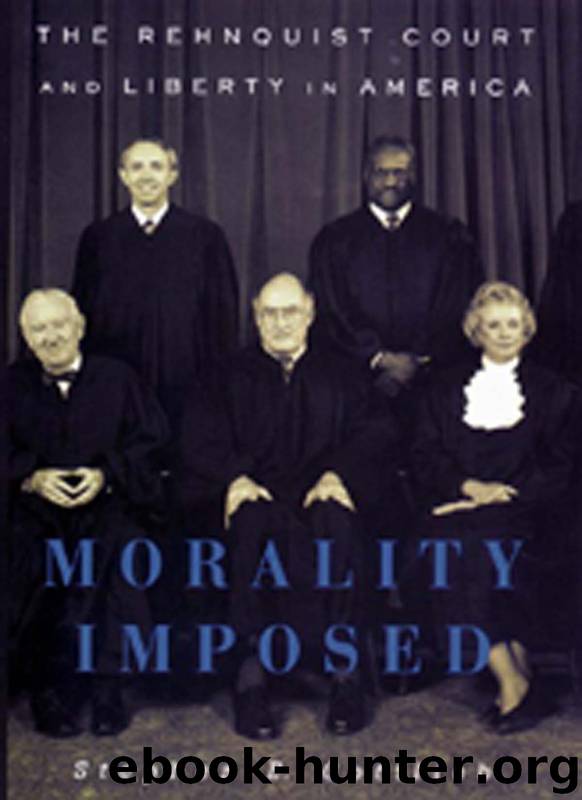Morality Imposed by Stephen E. Gottlieb

Author:Stephen E. Gottlieb
Language: eng
Format: epub
Publisher: New York University Press
Published: 2000-05-14T16:00:00+00:00
Organizational Assumptions
Separation of Powers. Traditionalists in the eighteenth century thought the legislative, executive, and judicial branches of government each had its own unique tasks that should not be interfered with by the others. Government functioned best when each branch minded its own business. By 1787 that picture had been destroyed by practice. Legislatures took over the government of the new country and the new states, appointing executives and deciding cases as if they were courts. The Federalists who wrote the Constitution would have neither approach to the separation of powers, and they were fairly clear about it in their classic statement in The Federalist. For them, government functioned best when the branches were arrayed against one another, competing for power over identical issues. We have called this checks and balances. Madison called it blended powers.44
We seem to be doomed to refight the battles among the traditionalists, the proponents of legislative power, and the Federalists, as if the Federalists had not settled the issue.
Modern conservatives sometimes have a stake in executive power when it seems to promote order. Modern liberals have sometimes had a stake in executive power when the executive seemed prepared to control private industry and economic power. In fact, neither has a unique and consistent theory of the separation of powers.
The separation of powers matters to the utilitarians on the Court and they are often supportive of coordinate branches, but it is not clear whether for liberty or efficiency. Souter and Breyer opposed Congress’s attempt to restore rights cut off by a surprising Supreme Court interpretation of a statute of limitations, but Stevens and Ginsburg dissented.45 That seems to have pitted social justice against concern for judicial prerogative and split the liberal camp. Stevens, dissenting alone, supported the right of the Federal Election Commission to handle cases in the Court without approval of the attorney general in order to secure the independence of the elections watchdog body, but this time Souter and Breyer preferred to honor the power at the top of the hierarchy of a coordinate branch.46 Most of them opposed the line-item veto, but Breyer saw no problem with the shift of power to the executive.47 It seems that Breyer reads the separation of powers with hierarchy and efficiency in mind while Stevens reads them with substantial justice foremost in his thoughts.
Federalism. Federalism has a very different role in liberal than in conservative thought. Conservatives dote on that part of Madison’s message that identified the value of localities in defending against a distant national government. They have overlaid that idea with the notion that small communities are more moral because they can oversee the morality of their members. Liberals stress the part of Madison’s message that identified the potential unfairness of smaller communities, and the benefits of large communities in meliorating the effects of faction.48 The national resolution of the civil rights struggle over sectional objections is a modern example of that side of Madison’s insight. Chief Justice Marshall understood the nationalism of Madison’s argument when he wrote, in McCulloch v.
Download
This site does not store any files on its server. We only index and link to content provided by other sites. Please contact the content providers to delete copyright contents if any and email us, we'll remove relevant links or contents immediately.
2010-The City & the City by China Miéville(1990)
Anatomy of Injustice by Raymond Bonner(1664)
That Every Man Be Armed by Stephen P. Halbrook(1579)
ADHD on Trial by Michael Gordon(1574)
Injustices by Ian Millhiser(1497)
You Don't Own Me by Orly Lobel(1445)
Tell by Major Margaret Witt(1438)
Course Correction by Ginny Gilder(1409)
Broken Scales by Joel Cohen(1352)
Without Copyrights by Spoo Robert(1347)
A Vast Conspiracy by Jeffrey Toobin(1327)
First by Evan Thomas(1284)
J by Howard Jacobson(1256)
A Religious Orgy in Tennessee by H.L. Mencken(1251)
The Run of His Life: The People v. O. J. Simpson by Jeffrey Toobin(1214)
A Triumph of Genius: Edwin Land, Polaroid, and the Kodak Patent War by Ronald K. Fierstein(1203)
A History Of Thailand by Baker Chris(1192)
John Wayne Gacy by Judge Sam Amirante(1114)
Law 101: Everything You Need to Know About American Law, Fourth Edition by Jay Feinman(1102)
